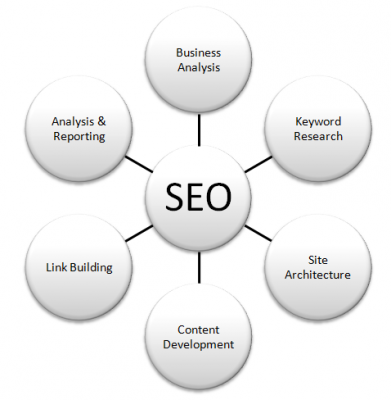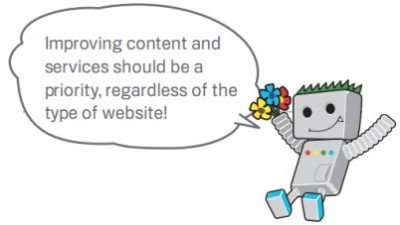SEO or Search Engine Optimization is the process of designing and building up a website in such a way, so as to result in an increase in the number of visitors to a Web site, by making it rank high in the search results of a search engine. The higher a Web site ranks in the results of a search, the greater the chance that that site will be visited by a user.

It is common practice for Internet users to not click through pages and pages of search results, so where a site ranks in a search is essential for directing more traffic toward the site. Such search engine-directed traffic is called Organic Traffic and it is such traffic that helps the website go a long way!
SEO helps to ensure that a site is accessible to a search engine and improves the chances that the site will be found by the search engine. The true definition of Search Engine Optimization (SEO) can be stated as a highly specialized process of building a successful website. We say successful because if a commercial website cannot be found in the major search engines, it is not successful, it just isn’t doing its job.
SEO revolves around the following parameters:
- Business Analysis: It is very important for any successful business that they understand their business needs, potential customers, upcoming trends in the market.
- Keyword Research: Keywords research and analysis is a very important aspect for SEO because generally the crawlers or bots of the search engines look for the typical Keywords which have a very high demand by various users, so it is important that your website have general keywords more rather than the fancy customized words.
- Site Architecture: Well a lot of emphasis should be given to easy site architecture. For the customers, it should not be very complex technology and should be quite easy to understand and navigate but for SEO it is better than it is well built allowing crawling on specific pages only. The linking of pages should be proper.
- Content Development: I have come across many sites especially personal and SME websites which do not have not much emphasis on the content. The content should be specific to your product/services or your business operations only. It should be precise, short, and lucid.
- Link Building: As I said earlier, the linking of pages should be very proper according to the need or requirements. You should try to minimize the hyperlinks which take the user out from your site whereas emphasis must be laid on getting traffic from various other sites/social networking sites to your site.
- Analysis & reporting: Do the analysis of your site at regular intervals and check its rating from time to time. Try to use some tools to generate reports related to it and take measures accordingly.
Microsoft offers a free website designing tool called WebMatrix which can be downloaded at no cost. It has an inbuilt tool to generate SEO reports, which I think all webmasters and bloggers should try out at least once for better results. Even if your site is not made via WebMatrix, then too you can use this tool.
Search Engine Optimization Starter Guide from Google
Google’s Search Engine Optimization Starter Guide first began as an effort to help teams within Google, but Google thought it’d be just as useful to webmasters that are new to the topic of search engine optimization and wish to improve their sites’ interaction with both users and search engines.
Google has updated and released its Search Engine Optimization Starter Guide, which gives a lot of SEO tips to bloggers and webmasters to help improves SERP or search rankings.

Although this guide won’t tell you any secrets that’ll automatically rank your site first for queries in Google, following the best practices outlined below will make it easier for search engines to both crawl and index your content.
Search engine optimization is often about making small modifications to parts of your website, and not being obsessed with implementing the so-called SEO tricks.
Read: What is Google RankBrain.
When viewed individually, these changes might seem like incremental improvements, but when combined with other optimizations, they could have a noticeable impact on your site’s user experience and performance in organic search results. You’re likely already familiar with many of the topics in this guide because they’re essential ingredients for any webpage, but you may not be making the most out of them.
The contents of this UPDATED SEO Guide includes:
- Improving Site Structure
- Improve the structure of your URLs
- Create unique, accurate page titles
- Make use of the “description” meta tag
- Make your site easier to navigate
- Optimizing Content
- Offer quality content and services
- Write better anchor text
- Optimize your use of images
- Use heading tags appropriately
- Dealing with Crawlers
- Make effective use of robots.txt
- Be aware of rel=”nofollow” for links
- SEO for Mobile Phones
- Notify Google of mobile sites
- Guide mobile users accurately
- Promotions and Analysis
- Promote your website in the right ways
- Make use of free webmaster tools.
Download: The Search Engine Optimization Starter Guide in pdf format. (Link updated to point to latest version)
Read next: Useful tips for new bloggers.